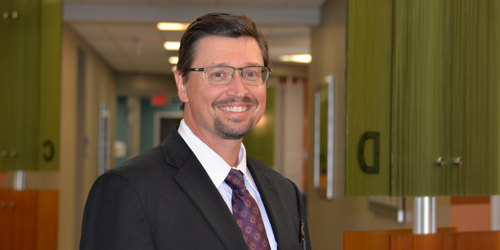
By George Mandybur, MD
If you or a loved one has Parkinson’s disease, you probably know that April is Parkinson’s Awareness Month. You probably also know that Parkinson’s is a condition that doesn’t stand still. What is true about your Parkinson’s today may not be true tomorrow. Symptoms change with this progressive neurological disease. As a result, treatments change as well.
Here are 6 things to know about surgery as a treatment option for Parkinson’s.
1. Deep brain stimulation surgery, also known simply as DBS surgery, is the primary surgical treatment for Parkinson’s. During surgery, we implant electrodes that deliver electrical signals to an area of the brain that is responsible for movement. The electrodes are connected to a stimulator device that resembles a pacemaker.
2. DBS does not cure Parkinson’s disease, nor can it improve declines in memory and thinking that come with Parkinson’s. But DBS surgery can help improve symptoms, such as tremor, slowness of movement, stiffness, and difficulty walking. It can significantly improve a patient’s quality of life.
3. Deep brain stimulation can be done while you are awake or asleep. Even if you are awake, you will feel no pain during the procedure.
4. DBS works best for patients who benefit from dopamine-replacement medication but are getting less and less benefit from their medication. These patients seesaw between “on” and “off” periods and typically suffer involuntary movements called dyskinesias, which develop after prolonged use of levodopa.
5. DBS is covered by Medicare and private insurance plans. The expense is considered worthwhile because patients may be able to continue working, reduce their medications, remain independent, and above all, enjoy a higher quality of life.
6. The best time to undergo DBS surgery varies for each individual. We don’t want you to have the procedure too early in the course of your disease, when your medications are still working well. And we don’t want you to have it too late, when the surgery’s benefits might be minimal. We want to follow the “Goldilocks theory” and choose the time that is “just right.” Your doctor can help you determine when that is.
* * * * *
George Mandybur, MD, is a neurosurgeon with Mayfield Brain & Spine. He specializes in surgery for patients with movement disorders, epilepsy, and chronic pain.
Dr. Mandybur will speak at the Parkinson Support & Wellness Spring Forum on Saturday, April 21, 2018 at The Manor House, 7440 Mason-Montgomery Road, Mason, Ohio 45040.
He will present “Movement Disorders: Current and Future Treatments” at the TriHealth Seniority Series:
1-2 p.m. Wednesday, May 9, at Bethesda North Hospital and
1-2 p.m. Thursday, May 10, at Nathanael Greene Lodge
To register, call (513) 569-6400 or go online >